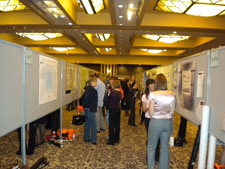
2010 Annual Meeting Recap
Michael Diefenbach, PhD, 2009 Program Committee Chair


More than 1,400 scientists, practitioners/clinicians, and policy makers attended the 31st Annual Meeting and Scientific Session in Seattle, Washington, making it the largest meeting in the history of SBM. This year's program for the annual meeting was built around the theme "Behavioral Medicine: Building for the Future." We received an unprecedented number of high quality applications that presented cutting-edge research and represented the future of behavioral medicine. The conference opened Wednesday evening April 7 with the presidential poster session after a day of diverse pre-conference workshops and activities. SBM president Francis J. Keefe, PhD, started the meeting officially Thursday morning with his keynote address entitled Behavioral Medicine: A Voyage into the Future. In his address he reminded us that building for the future begins with mentoring the next generation of scientists in the context of excellent science, focusing on translatable research that is relevant for the health of people and communities. Two Master Lectures underscored these points: Keith Wailoo, PhD, Martin Luther King Jr Professor of History, discussed how scientific and technological understandings have interacted with health care politics, racial and ethnic relations, and cultural politics and are currently informing responses to disease and health care reform. Hunter Hoffman, PhD, a cognitive psychologist from the University of Washington, WA, introduced a new way to help burn victims cope with pain during wound care through an immersive virtual reality program, SnowWorld. Dr. Hoffman also discussed the utility of interactive virtual reality programs for the treatment of phobias and post-traumatic stress disorder. A special treat for conference attendees was the option to try out and experience the software.
The Program Committee took advantage of the Seattle location by inviting William Crounse, MD, from Microsoft Corporation and Eric Dishman, from the Intel Corporation. Both presented engaging but different visions for the future of health care delivery and behavioral medicine. Dr. Crounse, Senior Director, Worldwide Health, at Microsoft emphasized the changes that technology will bring to health care delivery, from virtual doctors, to universal access to health care information through cloud computing. Eric Dishman, INTEL Fellow and Director of the Digital Health Group, presented a different view of the future. His talk focused on how technology can be used to enable independent living for seniors right now and in the future. Throughout his presentation, he challenged members of SBM to contribute their research and expertise to the current discussion about health care reform.

In his keynote address, on Friday, Howard Leventhal, PhD, Governors Professor of Health Psychology, Rutgers, The State University of New Jersey, reminded the audience of the social and cognitive psychological roots that are the basis of health behavior and that are at the heart of behavioral medicine. The theme of important psychological factors influencing health was continued by Jerry M. Suls, PhD, Professor of Psychology at the University of Iowa. His Master Lecture, entitled Heart Disease Occurs in a Social and Psychological Matrix: Risk Factors, Symptom Presentation and Adaptation, provided a review of state-of-the science research on the influence of psychological factors on heart disease. The importance of research on heart disease was also echoed in this year's Distinguished Scientist Master Lecture delivered by James A. Blumenthal, PhD, Professor of Psychology, Social and Health Sciences, Duke University. His presentation was entitled Depression as a Risk Factor for Heart Disease: Evidence and Implications for Screening and Treatment.
On Saturday, the first Master Lecture was presented by Rona L. Levy, MPH, PhD, Professor of Social Work at the University of Washington, Seattle. Dr. Levy, an expert in the treatment of irritable bowel syndrome presented results from a series of studies that examined the contribution of genetic and psychological factors in the etiology of this disorder. The second Master Lecture on Saturday was delivered by Jeffrey Levi, PhD, Executive Director, Trust for America's Health. Dr. Levi gave an overview of the state of the national health care reform and the important impact the new health care law will have on the health of our nation.
This year, the program featured a few changes that we hoped would make the meeting even more lively and interesting for attendees. The first feature was a specially invited Presidential Symposium on The Future of Genetic Understanding of Disease and the Role of Behavior in Health. Speakers at the symposium included Andrew C. Heath, DPhil, Washington University; Redford B. Williams, MD, Duke University; Thomas McGinn, MD, Mount Sinai School of Medicine; and Talya Miron-Shatz, PhD, Princeton University. The discussant was Colleen M. McBride, PhD. This symposium was standing room only and generated a lot of discussion that extended beyond the allotted time. The second new feature that we instituted for the first time was a State-of-the-Science address. This presentation was given by Timothy B. Baker, PhD, Director of Research at the University of Wisconsin Center for Tobacco Research and Intervention. This state-of-the science address was such a success that we are planning to make this type of address a regular feature of the SBM Annual meeting. Third, the Annals of Behavioral Medicine editor, Chris France, PhD, has agreed to publish selected Keynote and Master Lectures in a special section of Annals in the future. This will give everybody the opportunity to catch up on science they might have missed during the conference.
These were just a few of the many highlights that made this conference so enriching. Additional highlights included an evening at the Fred Hutchinson Cancer Center, organized by the Cancer SIG, during which members learned about funding initiatives from the NIH, NCI and the ACS; jam-packed poster and paper sessions that presented the latest research; and lots of formal and informal networking opportunities.
We would like to take this opportunity to thank our colleagues who worked so tirelessly to make this conference a success, especially members of the Local Arrangements Committee, the track chairs and reviewers, all of our student volunteers, and - of course - SBM staff. I would also like to thank my co-Chair, Gary G. Bennett, PhD, who contributed immensely to the success of the conference. By now he has taken over the reigns of the Program Chair position and is in the process of putting together an exciting program for 2011 in Washington, DC. The focus of the 2011 meeting will be health care policy and reform and how behavioral medicine can contribute its expertise to make this ambitious plan a success.
Finally, we would like to remind our membership to attend the meeting of the International Society of Behavioral Medicine, August 4 to 7, 2010 in Washington, DC. Best wishes to all and we'll see you in Washington, DC, this August and next April.